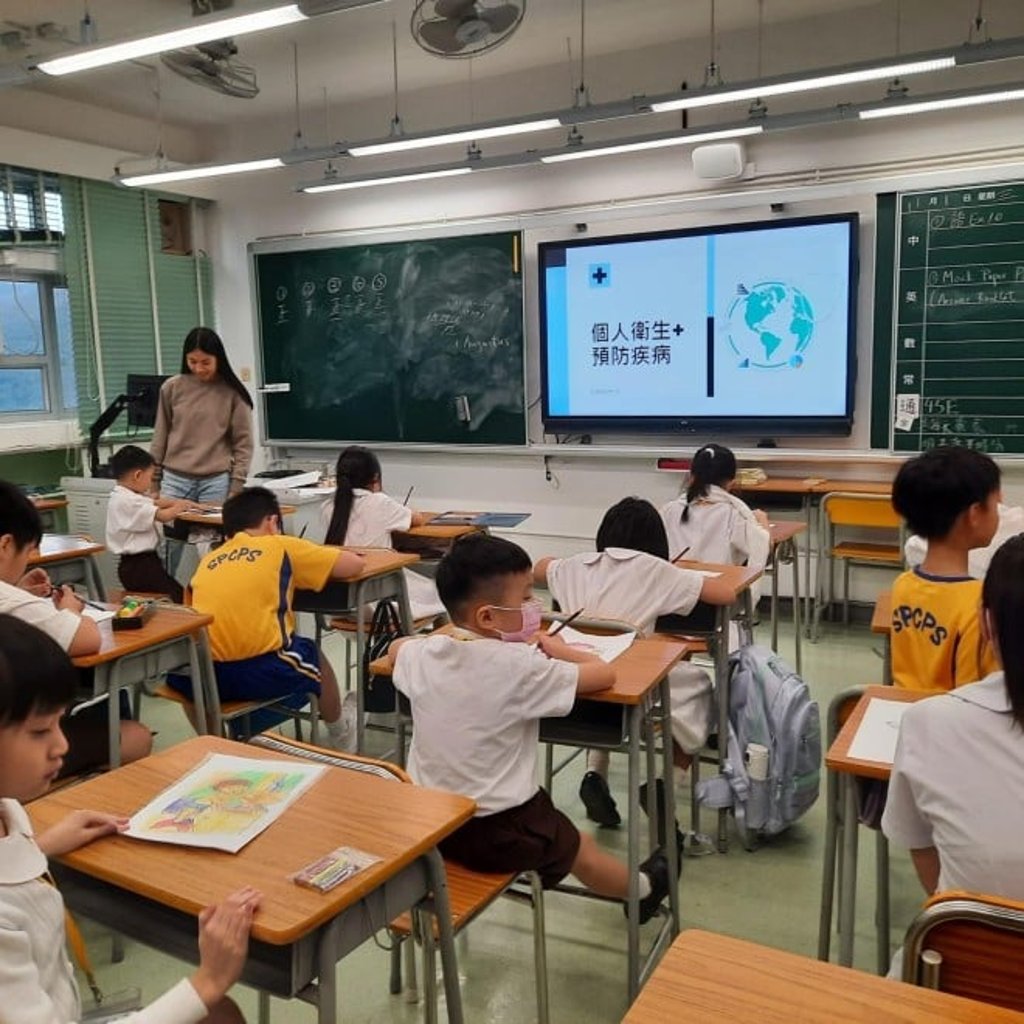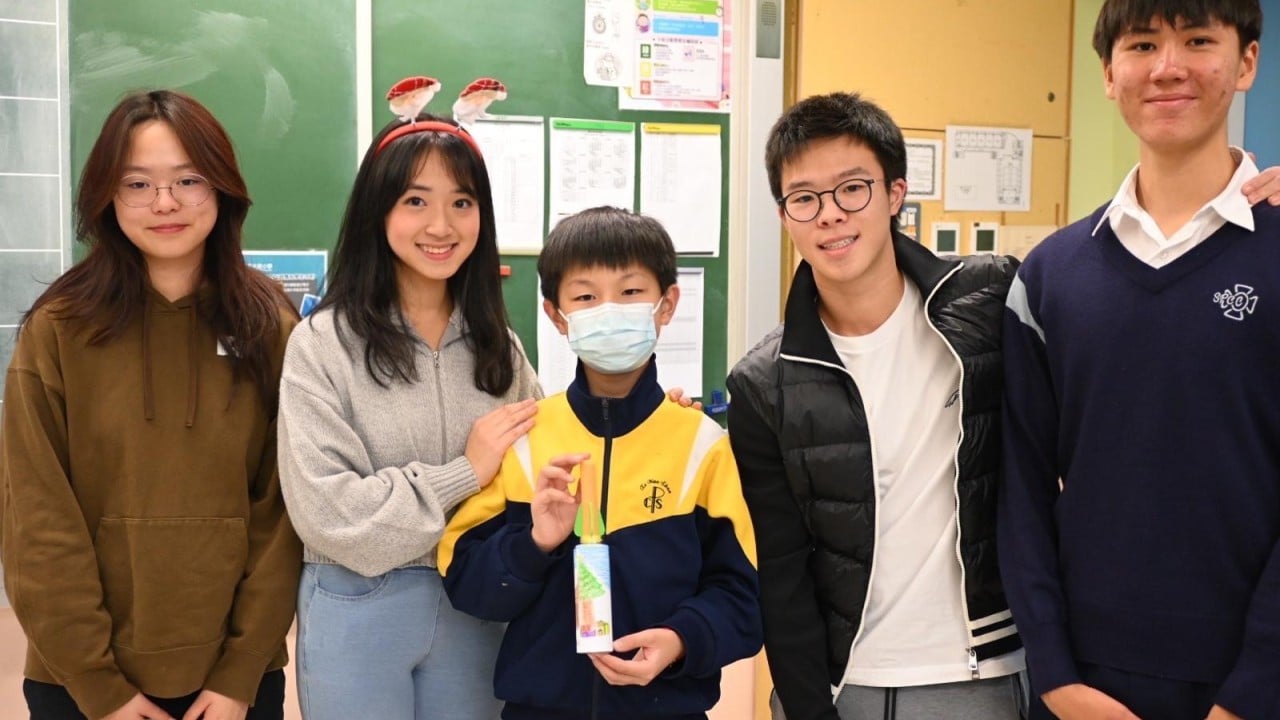Teenage volunteers at the Ten Percent Donation Scheme Foundation help disadvantaged primary students improve grades and cultivate independent thinking
[The content of this article has been produced by our advertising partner.]
Ethan Chong, Isabelle Chan, and Rachel Wu— friends since kindergarten and members of the non-profit organisation Ten Percent Donation Scheme Foundation—share a vision: a conducive learning environment is essential for children’s development. Their holistic approach emphasises engaging learning experiences that cultivate positive values and attitudes, leaving a lasting impact. Hong Kong’s after-school care for primary students, particularly those from disadvantaged backgrounds and single-parent households, falls short. In Sham Shui Po, the ratio of available after-school care places to students is a staggering 1:17. Enhanced after-school care services could significantly improve parents’ employment rates, especially for single mothers. Ethan, currently a Year 13 student at Winchester College in Britain, has been volunteering with Ten Percent’s outreach programme since he was 12. “My motivation is connecting with people and using the skills I developed while helping my younger sister with her studies,” Ethan says. Having experienced the British education system, Ethan noticed disparities in practical science teaching between schools in Hong Kong and Britain. Hong Kong schools often lack elements like troubleshooting, independent thinking, and experimentation. Determined to address these gaps, Ethan and fellow volunteers at Ten Percent transformed after-school care and tutoring services into instructional courses covering STEM, financial literacy, self-care, health, nutrition, and arts and crafts. Launched in October 2023 at five Catholic schools, the programme aims to provide high-quality after-school care to underprivileged children, enriching their academic experiences and enhancing self-care capabilities. Ultimately, this empowerment allows their parents to strike a better work-family balance, contributing to poverty alleviation, he says. Designed and delivered by local secondary students, including those from international schools, the courses emphasise interactivity, practicality, and applicability. Role plays, lectures, games, workshops, discussions, and experiments create a fresh and engaging learning experience. The complementary nature of these courses helps students deepen their understanding of the curriculum at their schools and apply the knowledge to daily life. The programme started with around 20 primary students – including those with special education needs – from five schools that are part of Hong Kong’s Catholic Diocese. With a rigorous feedback system aimed at continuous improvement of the programme, feedback from the participating schools’ principals, teachers, and parents shows high satisfaction levels and improved student grades. To date, over 100 students have gained inspiration and skills through this transformative initiative. Financial literacy and home safety
Inspired by a friend, Ethan has developed a course that introduces primary students to the concept of money. “It’s a crucial factor they need to consider when making independent choices,” he says. The course aims to cultivate a sound mindset for financial decision-making. Students explore topics such as savings, borrowing, debt, charitable donations, and financial fraud. Additionally, the curriculum covers Internet and phone scams. Ethan believes that some students may even share this knowledge with their parents.

To engage students in this important subject, Ethan and his team employ games like Monopoly and role-playing exercises. Given that many primary students spend extended periods alone at home due to their parents’ long work hours, instilling the concept of home safety is essential, he says. The home safety course equips students with essential emergency skills for such situations. Through interactive methods, including role plays and games, students learn how to respond effectively to real-life scenarios. Lists of questions guide them in applying these skills. STEM and practical science
Isabelle, currently a Year 13 student at Harrow International School Hong Kong, shares a profound interest in STEM with Ethan. Their views on education align closely. During a recent community service trip to Cambodia, Isabelle observed educational challenges and aims to address similar issues in Hong Kong. She says, “I want to transform the trajectory of education and leave a positive impact on students.” Together with Ethan, Isabelle delivers a STEM course that emphasises practical science through interactive games and competitions. Activities include creating elephant toothpaste and launching paper rockets. To nurture curiosity, Isabelle introduced a neuroscience class exploring the five senses. Learning transcends textbooks; for instance, students explore smell and taste while blindfolded. “The competitive format of the paper rocket launch stimulates creativity,” she adds. Isabelle recognises this as a mutual learning experience. She finds the paper rocket engineering party particularly eye-opening, as students ask challenging questions. “They demonstrate significant potential,” she notes.

Global health
In the wake of the pandemic, knowledge about infectious diseases, preventive measures, and healthcare has become increasingly crucial. Rachel, a Year 13 student at Hong Kong International School, shares her passion for health and nutrition with primary students through an engaging global health programme. Last summer, she participated in a course at the University of Southern California, where she learned about sanitation, disease prevention, personal hygiene, and physical health.

“Our global health course is designed to equip students with essential knowledge through interactive activities like role-playing and games,” Rachel says. “By enhancing their self-care capabilities, we hope to relieve parents’ burdens and encourage informed health decisions that positively impact families and communities.” Volunteers are welcome
Ten Percent’s programmes are driven by passionate and knowledgeable teenage volunteers. They share a vision on education and high-quality after-school care. Ethan says these volunteers teach subjects they love, allowing their enthusiasm to naturally inspire and engage young learners. Isabelle reflects on her experience: “Adapting to each student’s unique learning style has been a valuable lesson. Designing courses and interacting with primary students, schools, and other NGOs have let me hone my communication and organisational skills.” All three volunteers agree that the opportunities to sharpen their communication and leadership skills through their work with Ten Percent have been extremely rewarding. These are also the skills that would become incredibly important once the student volunteers enter universities, and into the workforce eventually. Above all though, Ethan notes, “passion matters.” Looking ahead, Ten Percent aims to expand its programme to include foundational English, geography and robotics and increase its collaboration with other NGOs. “We aim to recruit more local secondary schools as volunteers to spread the spirit of helping others,” Rachel says. Through these, Ten Percent is committed to engaging more schools and students in Hong Kong in the years to come.

If you are interested in volunteering with Ten Percent, please get in touch via email at[email protected]or visit Ten Percent’s website athttps://www.tenpercent.org.hk/en/home-en/.


